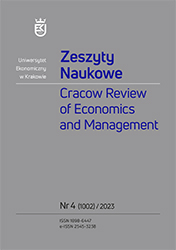Social Wellbeing in the Workplace: HR Activities and Impact
DOI:
https://doi.org/10.15678/ZNUEK.2023.1002.0406Keywords:
employee wellbeing, social wellbeing, COVID-19 pandemic, HR departmentAbstract
Objective: The aim of the article is to present the results of research on social wellbeing in the workplace, with particular emphasis on the activities and social impact of Human Resources departments.
Research Design & Methods: Qualitative research was carried out in the form of in-depth interviews using the author’s interview questionnaire. The target group consisted of representatives of personnel departments.
Findings: The actions that companies take to influence the social wellbeing of employees as well as the measurements that companies use to evaluate their activities and wellbeing have been listed. The impact of the COVID-19 pandemic on the idea of wellbeing in companies is discussed. Companies’ plans for the future in the field of social wellbeing are presented.
Implications / Recommendations: Respondents have different understandings of the definition of employees’ social wellbeing. They take many actions in the field of social wellbeing, which means that it is significant for them. HR departments are the biggest contributors to wellbeing activities, but management and the management board should also be involved. There are problems with accurate measurement of wellbeing and the effect of wellbeing activities. The COVID-19 pandemic has increased the importance of wellbeing.
Contribution: Filling a gap in the research on the social wellbeing of employees in the specific circumstances caused by the pandemic and the introduction of remote work. Filling a gap regarding the evaluation of wellbeing activities carried out in organisations.
Downloads
References
Abdelmotaleb M., Saha S. K. (2020), Socially Responsible Human Resources Management, Perceived Organizational Morality, and Employee Well-being, “Public Organization Review”, vol. 20(2), https://doi.org/10.1007/s11115-019-00447-3.
Armstrong M., Taylor S. (2020), Armstrong’s Handbook of Human Resource Management Practice, Kogan Page Publishers, London.
Benita S. M., Ghayathri N. (2020), Impact of Work from Home on Employee Wellbeing during Pandemic, “Journal of Contemporary Issues in Business and Government”, vol. 26(2), doi.org/10.47750/cibg.2020.26.02.057.
Björk J. M., Bolander P., Forsman A. K. (2022), Investigating Employee Perceptions: Association between Recognized Individual Talents and Social Wellbeing, “Frontiers in Psychology”, vol. 13, https://doi.org/10.3389/fpsyg.2022.959559.
Camfield L., Crivello G., Woodhead M. (2009), Wellbeing Research in Developing Countries: Reviewing the Role of Qualitative Methods, “Social Indicators Research”, vol. 90(1), https://doi.org/10.1007/s11205-008-9310-z.
Chia A., Kern M. L. (2021), Subjective Wellbeing and the Social Responsibilities of Business: An Exploratory Investigation of Australian Perspectives, “Applied Research in Quality of Life”, vol. 16(5), https://doi.org/10.1007/s11482-020-09846-x.
Czerw A. (2017), Psychologiczny model dobrostanu w pracy. Wartość i sens pracy, Wydawnictwo Naukowe PWN, Warszawa.
Danna K., Griffin R. W. (1999), Health and Well-being in the Workplace: A Review and Synthesis of the Literature, “Journal of Management”, vol. 25(3), https://doi.org/10.1177/014920639902500305.
Kniffin K. M., Narayanan J., Anseel F., Antonakis J., Ashford S. P., Bakker A. B., Bamberger P., Bapuji H., Bhave D. P., Choi V. K., Creary S. J., Demerouti E., Flynn F. J., Gelfand M. J., Greer L. L., Johns G., Kesebir S., Klein P. G., Lee S. Y., Vugt M. van (2021), COVID-19 and the Workplace: Implications, Issues, and Insights for Future Research and Action, “American Psychologist”, vol. 76(1), https://doi.org/10.1037/amp0000716.
Kulig-Moskwa K., Nogieć J. (2018), Wellbeing w organizacji – istota i perspektywa polskiego rynku, “Przedsiębiorczość i Zarządzanie”, vol. 19(8).
Kundi Y. M., Aboramadan M., Elhamalawi E. M. I., Shahid S. (2021), Employee Psychological Well-being and Job Performance: Exploring Mediating and Moderating Mechanisms, “International Journal of Organizational Analysis”, vol. 29(3), https://doi.org/10.1108/IJOA-05-2020-2204.
Liu F., Chow I. H.-S., Xiao D., Huang M. (2017), Cross-level Effects of HRM Bundle on Employee Well-being and Job Performance: The Mediating Role of Psychological Ownership, “Chinese Management Studies”, vol. 11(3), https://doi.org/10.1108/CMS-03-2017-0065.
Portela M., Neira I., Salinas-Jiménez M. M. (2013), Social Capital and Subjective Wellbeing in Europe: A New Approach on Social Capital, “Social Indicators Research”, vol. 114(2), https://doi.org/10.1007/s11205-012-0158-x.
Rawhouser H., Cummings M., Newbert S. L. (2019), Social Impact Measurement: Current Approaches and Future Directions for Social Entrepreneurship Research, “Entrepreneurship Theory and Practice”, vol. 43(1), https://doi.org/10.1177/1042258717727718.
Seligman M. E. P. (2012), Flourish: A Visionary New Understanding of Happiness and Well-being, Simon & Schuster, New York.
Singh S., Chaudhary N. (2019), Quality of Work Life and Dynamics of Work-related Wellbeing: An Exploratory Study of Textile Employees, “International Management Review”, vol. 15(2).
Strout K. A., Howard E. P. (2012), The Six Dimensions of Wellness and Cognition in Aging Adults, “Journal of Holistic Nursing”, vol. 30(3), https://doi.org/10.1177/0898010112440883.
Tabor-Błażewicz J. (2021), Dobrostan pracowników. Koncepcje, zadania, wyniki badań, Oficyna Wydawnicza SGH, Warszawa.
Usman M., Cheng J., Ghani U., Gul H., Shah W. U. (2023), Social Support and Perceived Uncertainties during COVID-19: Consequences for Employees’ Wellbeing, “Current Psychology”, vol. 42, https://doi.org/10.1007/s12144-021-02293-3.
Van De Voorde K., Paauwe J., Van Veldhoven M. (2012), Employee Well-being and the HRM – Organizational Performance Relationship: A Review of Quantitative Studies, “International Journal of Management Reviews”, vol. 14(4), https://doi.org/10.1111/j.1468-2370.2011.00322.x.
White S. C. (2017), Relational Wellbeing: Re-centring the Politics of Happiness, Policy and the Self, “Policy and Politics”, vol. 45(2), https://doi.org/10.1332/030557317X14866576265970.
Wyzwania kierowania ludźmi w systemie hybrydowej organizacji pracy (2022), J. Tabor-Błażewicz, H. Rachoń (eds), Oficyna Wydawnicza SGH, Warszawa.
Zheng X., Zhu W., Zhao H., Zhang C. (2015), Employee Well-being in Organizations: Theoretical Model, Scale Development, and Cross-cultural Validation, “Journal of Organizational Behavior”, vol. 36(5), https://doi.org/10.1002/job.1990.
Downloads
Published
Issue
Section
License
Copyright (c) 2023 Zeszyty Naukowe Uniwersytetu Ekonomicznego w Krakowie / Cracow Review of Economics and Management

This work is licensed under a Creative Commons Attribution 4.0 International License.




